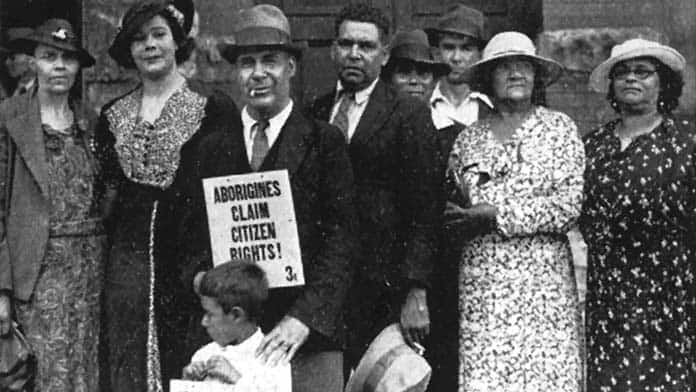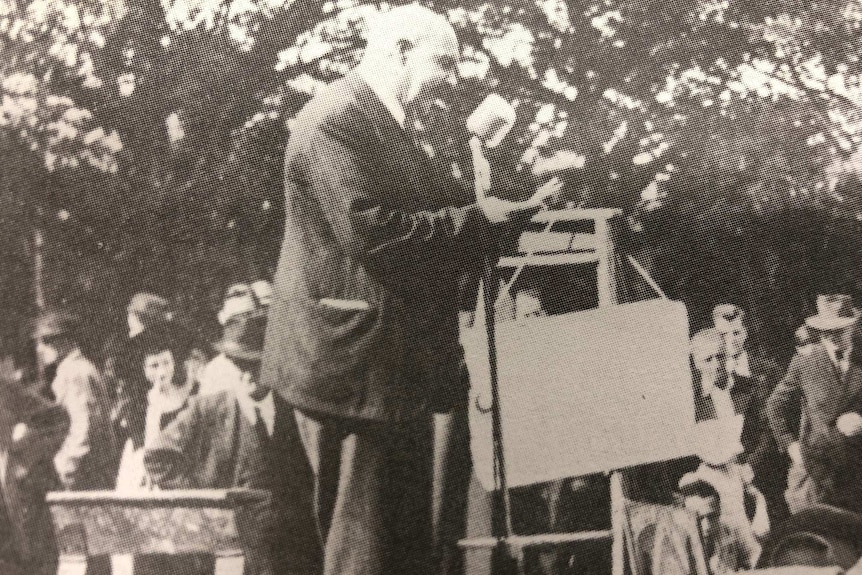
Bill Ferguson (holding sign) at the 1938 Day of Mourning protest. Photos: AIATSIS Collection.
As NAIDOC Week celebrates its 50th anniversary in 2025 with a theme focusing on ”The Next Generation: Strength, Vision & Legacy”, we thought it worthwhile to head back to where it all began and remember the Wiradjuri man from the Riverina who helped lay the foundations for the recognition and celebration that would follow.
When the Commonwealth of Australia was established in 1901, it was built on apologetically racist foundations. Our first prime minister, Edmund Barton, began his term by introducing the White Australia Policy’s Immigration Restriction Bill of 1901 with the declaration that “these races are, in comparison with white races – I think no one wants convincing of this fact – unequal and inferior”.
Before 1921, it was extremely difficult for Indigenous Australians to obtain citizenship or the right to vote and they were instead deemed wards of the state or forced to apply to become naturalised British subjects.
It was in this environment that a new generation of Aboriginal leaders began to emerge from the missions. They were proudly Aboriginal but had also been educated in the European art of public speaking and politics and were able to “walk between two worlds”.
Bill Ferguson was born in 1882 at Waddai (Darlington Point) on the Murrumbidgee to a Scottish father and a Wiradjuri mother. He embraced both his Celtic and Wiradjuri ancestry, learning his mother’s language and culture, and received an education in English on Warangesda Mission.
At 14, he followed his father into the volatile shearing sheds of the turn-of-the-century Riverina, where he learned to stand up for himself with both his words and his fists, and he was soon also speaking out for his fellow workers.
The teenage labourer was outraged to discover that other Aboriginal workers, without a white father to advocate for them, were being paid half the wages he was, and he began advocating for equality and recognition.

Bill Ferguson collapsed after his final speech, and died on 4 January, 1950, in Dubbo.
As both a respected church leader and an outspoken Australian Workers’ Union representative, Ferguson threw himself into his advocacy work in the 1930s and began to methodically document the shortcomings and abuses taking place on the missions administered by the Aboriginal Protection Board.
In June 1937, Ferguson called a public meeting in Dubbo’s Masonic Hall to form the Aborigines’ Progressive Association and laid bare the weight of damning evidence of poor schooling, untreated illnesses, the withholding of rations, low wages, and sexual and physical abuse.
The APA put forward a motion demanding the removal of the Protection Board and for full citizenship rights for Australia’s First Peoples and were successful in pressuring the state government to establish a Select Committee of Inquiry in November 1937.
As members and ministers began to boycott proceedings, Ferguson packed the gallery with church groups, women’s organisations and journalists.
“We must educate the minds of the white people, otherwise the thrusting back of my people, which began 150 years ago, will continue – until they are swept off the face of the earth,” he said.
As the inquiry was getting underway, the nation was preparing to celebrate the 150th anniversary of British colonisation in Sydney on January 26, 1938, with parades, ceremonies and a re-enactment of the British marines driving back the ”hostile natives”.
William Cooper from the Victorian-based Australian Aborigines’ League proposed a Day of Mourning and Ferguson and Jack Patten from the APA began to organise a mass protest to coincide with the 26 January celebrations.
Local Aboriginal people refused to participate in the colonial re-enactment and men from Menindee and Brewarrina were coerced into taking part and were secretly trucked to Sydney and held under guard at the Redfern police barracks until the parade.
On the eve of the sesquicentennial event, Ferguson and Patten authored a media release declaring that “the 26th of January 1938 is not a day of rejoicing for Australia’s Aborigines; it is a day of mourning”.
“This festival of 150 years’ so-called ‘progress’ in Australia commemorates also 150 years of misery and degradation imposed upon the original native inhabitants by the white invaders of this country.”
They asked not for charity but for “justice”.
The Day of Mourning protest was a watershed moment for civil rights in Australia and two years later, Ferguson and Cooper instigated Aboriginal Sunday in churches across Australia on the eve of national celebrations on 26 January.
Ferguson continued to campaign for his people and even ran for parliament himself. In December 1949, he proclaimed to a small crowd in Dubbo: “To all you people of Aboriginal blood, I say I am fighting for your freedom!”
As he left the stage, he collapsed and on 4 January, 1950, died in the Dubbo Base Hospital.
While he did not live to see it, the movement persisted and moved beyond the church with the foundation of the National Aborigines Day Observance Committee – or NADOC – and the first National Aborigines Day was held in 1957.
Ongoing advocacy over the next decade led to a resounding ‘’Yes’’ vote on Aboriginal inclusion in the 1967 Referendum, and in 1975 the event was extended to become a week-long celebration of culture, resistance and hope that continues today.







